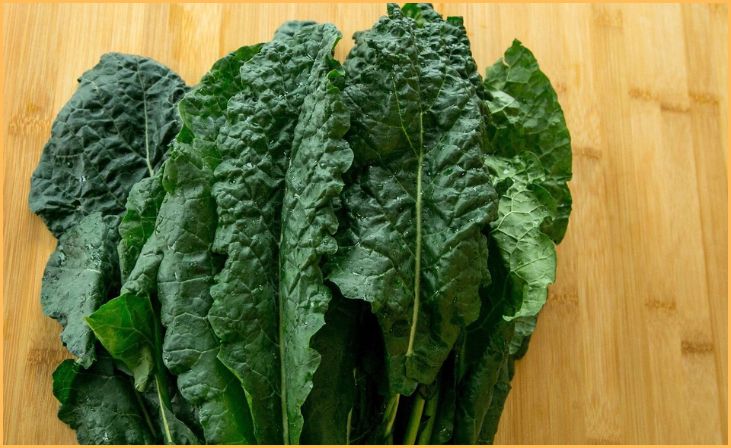Embarking on a journey toward vibrant health extends far beyond the simple act of adhering to dietary recommendations. It evolves into a profound exploration, a trek into the lush realm of leafy greens that promises a tapestry of well-being. Within this comprehensive guide, we not only acknowledge the significance of these verdant wonders but also rank the top 8 most nutritious leafy greens. Brace yourself for an enlightening adventure as we unravel the diverse ways to relish the wholesome goodness encapsulated within these vibrant greens.
8 Most Nutritious Leafy Greens—Ranked!
Kale:

Kale is often hailed as a superfood due to its remarkable nutritional profile. Rich in vitamins A, C, and K, this leafy green provides essential antioxidants that support overall health. Vitamin A is crucial for maintaining healthy vision, skin, and a robust immune system. Vitamin C, known for its immune-boosting properties, also aids in collagen production for skin health. Meanwhile, vitamin K plays a vital role in blood clotting and bone metabolism. Additionally, kale is a good source of minerals like calcium and potassium, promoting bone health and regulating blood pressure.
Also Read:- Weight-Loss Vegetables
Spinach:
Spinach, a versatile and nutrient-dense leafy green, is renowned for its iron content, essential for red blood cell production and preventing anemia. Loaded with magnesium, it supports muscle and nerve function, contributing to overall cardiovascular health. Spinach is also a great source of vitamin K, promoting bone health and blood clotting. Its wealth of vitamins, including A and C, further enhance its antioxidant properties, protecting the body from oxidative stress.
Swiss Chard:
Swiss chard boasts vibrant, colorful leaves and is a nutritional powerhouse. Rich in vitamins A and K, it supports vision, immune function, and bone health. The presence of magnesium in Swiss chard contributes to muscle and nerve function, while its fiber content aids digestion. Additionally, this leafy green contains potassium, a mineral crucial for maintaining a healthy balance of fluids and electrolytes.
Collard Greens:

Collard greens, a member of the cruciferous vegetable family, are high in fiber and essential nutrients. The fiber content supports digestive health, while vitamins A, C, and K contribute to immune function, collagen synthesis, and bone health, respectively. Collard greens also provide folate, a B-vitamin important for cell division and DNA synthesis.
Broccoli Rabe:
Broccoli rabe, with its slightly bitter taste, adds a unique flavor to dishes along with a nutritional boost. High in vitamins A and K, it supports vision, immune function, and bone health. The presence of fiber aids digestion, and its iron content contributes to red blood cell formation, preventing anemia.
Romaine Lettuce:
Romaine lettuce, with its crisp and refreshing leaves, is a hydrating and nutritious choice. With a high water content, it helps maintain hydration levels in the body. Additionally, it provides a substantial amount of vitamin K, supporting blood clotting and bone health.
Arugula:
Arugula, known for its peppery flavor, is a leafy green rich in vitamins A and K. These vitamins play crucial roles in maintaining healthy skin, vision, and bone density. Arugula’s antioxidant properties help combat oxidative stress in the body, contributing to overall well-being.
Mustard Greens:

Mustard greens, with their distinctive taste, offer a variety of nutrients. High in vitamin K, they contribute to bone health and blood clotting. Mustard greens also provide folate, supporting cell division and DNA synthesis. Rich in antioxidants, they help protect the body from free radicals, promoting overall health. Incorporating mustard greens into your diet adds a flavorful and nutritious element to meals, contributing to a well-rounded and health-conscious eating plan.
Benefits Of Eating Leafy Greens
Eating leafy greens offers a plethora of health benefits, making them a vital component of a balanced and nutritious diet. Here are some of the key advantages:
Rich in Nutrients: Leafy greens are dense with essential vitamins and minerals such as vitamin A, vitamin C, vitamin K, and folate. These nutrients play crucial roles in maintaining overall health, supporting immune function, and aiding in blood clotting.
High in Fiber: Leafy greens are an excellent source of dietary fiber, promoting digestive health and aiding in weight management. Fiber helps regulate bowel movements, prevent constipation, and contribute to a feeling of fullness, which can assist in weight control.
Antioxidant Power: Many leafy greens boast high levels of antioxidants, including beta-carotene and lutein. Antioxidants help combat oxidative stress in the body, potentially reducing the risk of chronic diseases and supporting skin health.
Heart Health: The potassium content in leafy greens contributes to heart health by helping regulate blood pressure. Additionally, the presence of folate and magnesium supports cardiovascular well-being.
Bone Strength: Leafy greens, particularly those high in vitamin K, contribute to bone health by aiding in calcium absorption and promoting bone mineralization. This is crucial for maintaining strong and healthy bones.
Blood Sugar Regulation: The fiber and antioxidants found in leafy greens may assist in stabilizing blood sugar levels, making them a valuable addition to the diets of individuals with diabetes or those at risk of developing the condition.
Weight Management: With their low calorie and high nutrient content, leafy greens are an excellent choice for those looking to manage their weight. They provide essential nutrients without contributing excessive calories.
Also Read:- Foods You Should Eat as You Get Older
Conclusion
In the course of delving into the intricacies of the 8 most nutritious leafy greens, we’ve embarked on a captivating journey that spans the realms of flavor, health, and culinary creativity. It’s more than a mere exploration; it’s an invitation to elevate your nutritional experience and infuse the joy of eating with vibrant, green richness. As you incorporate these nutrient-packed greens into your diet, you’re not just enhancing your overall nutrition; you’re embracing a culinary adventure that heightens the pleasure of every bite. So, dare to explore, be willing to experiment, and relish the kaleidoscope of tastes and textures that the world of leafy greens graciously offers.
FAQs
All leafy greens provide nutritional advantages, although some people may need to restrict certain types of greens because of particular medical issues. For individualized guidance, always seek the assistance of a healthcare practitioner.
Absolutely! Many leafy greens can be interchangeable in recipes. Experiment with different greens to find your preferred flavor and texture.







